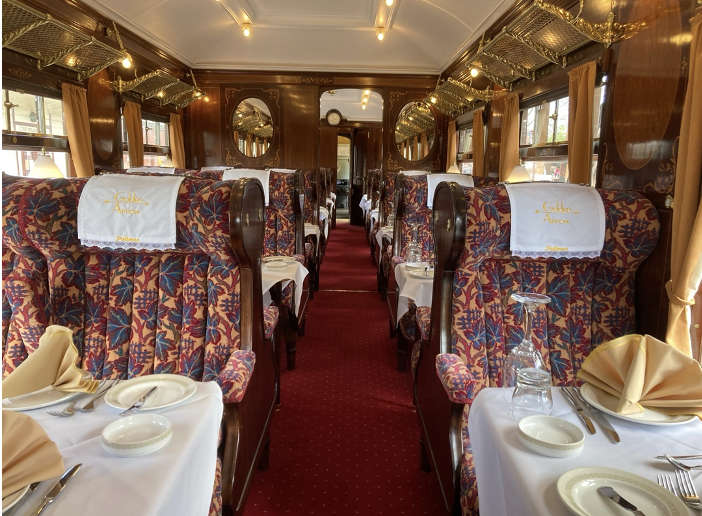
‘Car 54’ launches today, offering the 'luxury and style' of the Golden Arrow Pullman dining to visitors, which now includes people who cannot transfer from their wheelchairs.
‘Car 54’s’ 1920s glamour and style has undergone 'sympathetic changes' to a traditional Pullman interior like higher table heights and wider access doors.
The railway has converted what would have been the luggage compartment into an electric lift for wheelchairs.
The eight-year restoration of ‘Car 54’ by the Bluebell Railway’s own carriage and wagon department started in 2016 and has cost in the region of £600,000, which included employing additional staff to work alongside volunteers.
Surrey-based Paralympian Fabienne Andre, who has had recent successes for Team GB at the European and World Championships and for Team England at the Commonwealth Games, will cut the ribbon to officially open the new car, before taking a journey in it.
‘Car 54’ now sits with other Pullman Cars ‘Christine’ and ‘Fingall’, recreating the Golden Arrow, which once linked London and Paris with the style and panache which made it one of the most glamorous and famous trains in the world.
The Pullman carriages evoke the heady days of the 1920 and 30s with their unique wooden wall panel Marquetry and plush seating.
‘Car 54’ will be officially launched today (April 24).
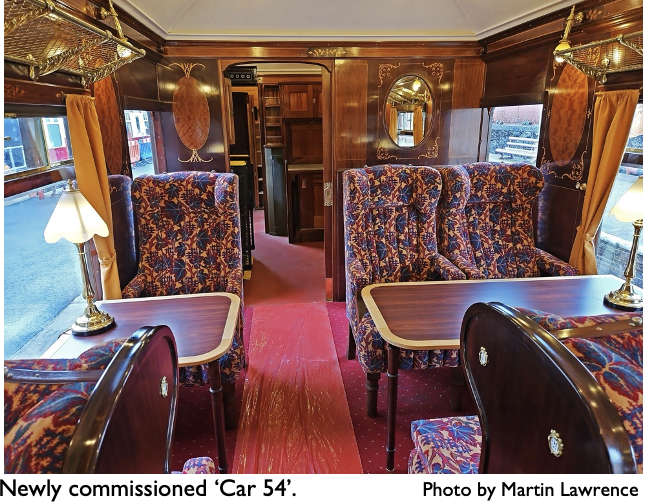
Visit https://www.bluebell-railway.com/golden-arrow/
‘Car 54’ - A brief history.
‘Car 54’ was built in 1923 by Claytons of Lincoln, as a Third class Kitchen Car.
It was one of the prototypes of the K-type Pullman, with a metal underframe rather than a combined wooden body and underframe. It was also one of the earliest Third-Class Pullmans Cars, and these did not carry a name.
It was rebuilt in 1937 as a brake coach, with a shorter saloon.
The windows on this car are closer together than most Pullmans, as a result of which, at a later date the seats were re-organised so that they no longer lined up with the windows.
It was preserved in 1968, initially at the Dart Valley Railway, then at Tyseley in Birmingham.
It was bought for use on the British portion of the revived Venice Simplon Orient Express (VSOE), and a start made on stripping it down for a rebuild, but part way through a decision was made not to use Third-class vehicles on the VSOE. It therefore remained in storage at Carnforth, and offered for sale.
It was purchased by the Horsted Keynes Pullman Car Group in 1984, for eventual use on the Bluebell Railway.
It was considered for restoration in 2003, but the decision was made at that time to instead overhaul Pullman Car 64 (now named 'Christine' which alongside ‘Fingall’ and ‘Car 54’ forms The Golden Arrow Pullman dining train).
Its overhaul started in 2016, and has cost in the region of £600,000, which included employing additional staff to work alongside our volunteers.
Funding for its overhaul came partly from donations received as a result of releasing Pullman Car 'Doris' for use on the recreated ‘Brighton Belle’, partly from a grant from the Department for Transport (DfT), topped up with funding from the Bluebell Railway Trust and from the Bluebell Railway Plc.
The DfT grant of £75,000 was to enable the adaptation of the vehicle for wheelchair access, using electric lifts in the double doors of the luggage compartment. It has also involved making the passenger area larger internally with a wider internal doorway, but the exterior is unaltered.
As part of the reconstruction, the seats were redesigned, and whilst looking like the originals, now line up with the windows, as they had done in 1923 when it was built.
Most of the seating is fixed, but three loose chairs, modelled on those used in First-class Pullmans, are provided to give flexibility for accessibility.
The overhaul has involved:
Lifting the body off the underframe
Repairing the underframe, including the replacement of both headstocks (ends), gangways and buffers, as well as replacing 300 hot rivets in the underframe.
Overhauling the running gear has required re-tyring of the wheels, replacing horn-guides and springs, and designing and fitting new brake gear.
The steam heating system is all new.
The timber body ends were in poor condition and have been replaced, as has the floor and roof.
One panel of the external aluminium sheeting, fitted in the 1950s, has survived, but all the rest has been replaced.
The original interior marquetry had survived. It has been repaired in-house by removing the rotten backing plywood and glueing the veneers onto new backing. Some new panels were required, and significant repairs to all the others.
The seating has been trimmed using moquette material which is a reproduction of an original Pullman Car Company design.
The roof and intricate internal coved ceiling have been replaced.
The lavatory compartment has been exquisitely restored.
The paint finish is done by hand bushing and required around a dozen coats of primer, filler, undercoat, topcoat and varnish.

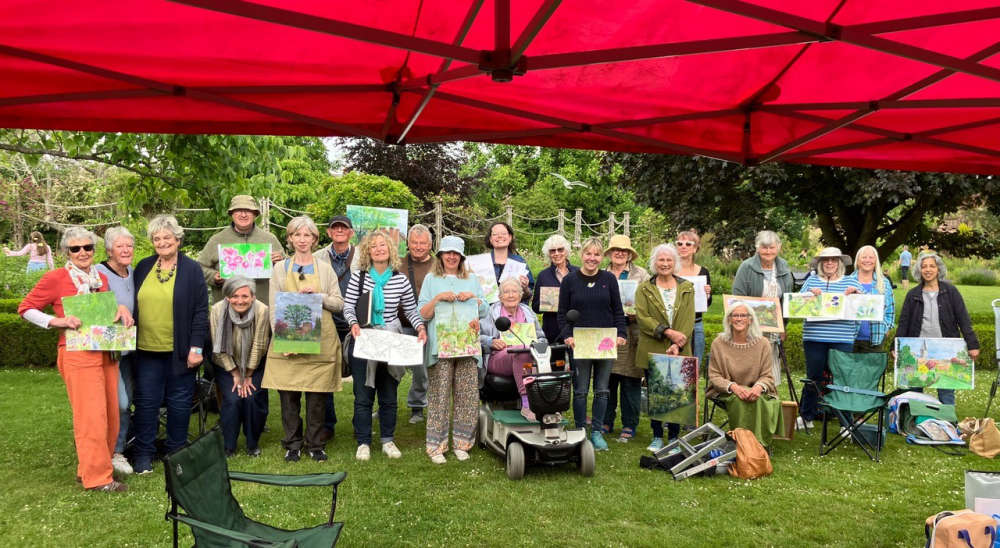 Free Open-Air Painting Exhibition Coming To Chichester
Free Open-Air Painting Exhibition Coming To Chichester
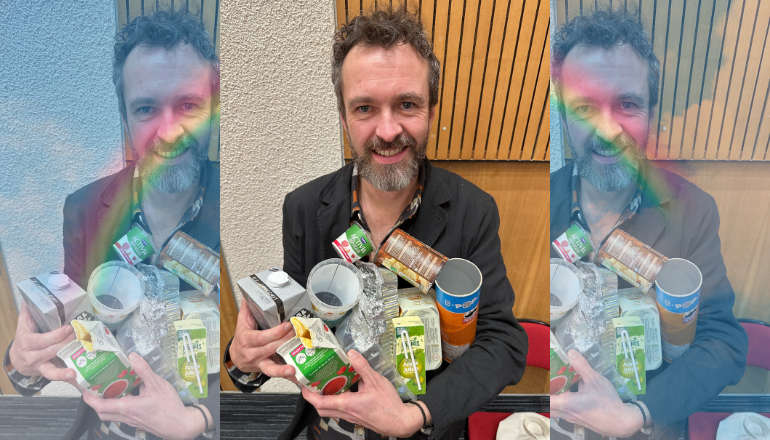 Magpie Boss Calls For Better Recycling Service In Brighton
Magpie Boss Calls For Better Recycling Service In Brighton
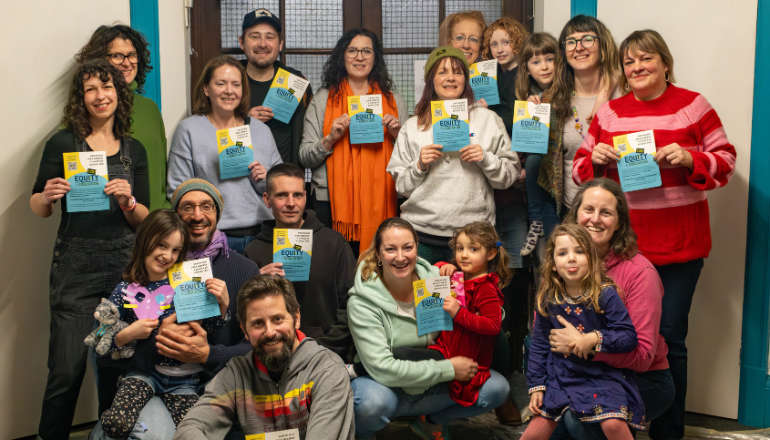 Brighton Parents Campaign For School Admissions Change
Brighton Parents Campaign For School Admissions Change
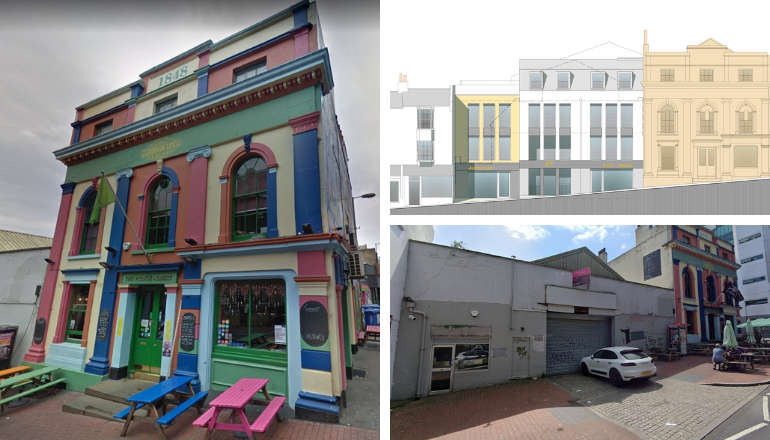 Planning Appeal Won For Offices By Brighton Pub
Planning Appeal Won For Offices By Brighton Pub
 Extra Money Approved For More Than 200 New Council Homes On Brighton Estate
Extra Money Approved For More Than 200 New Council Homes On Brighton Estate